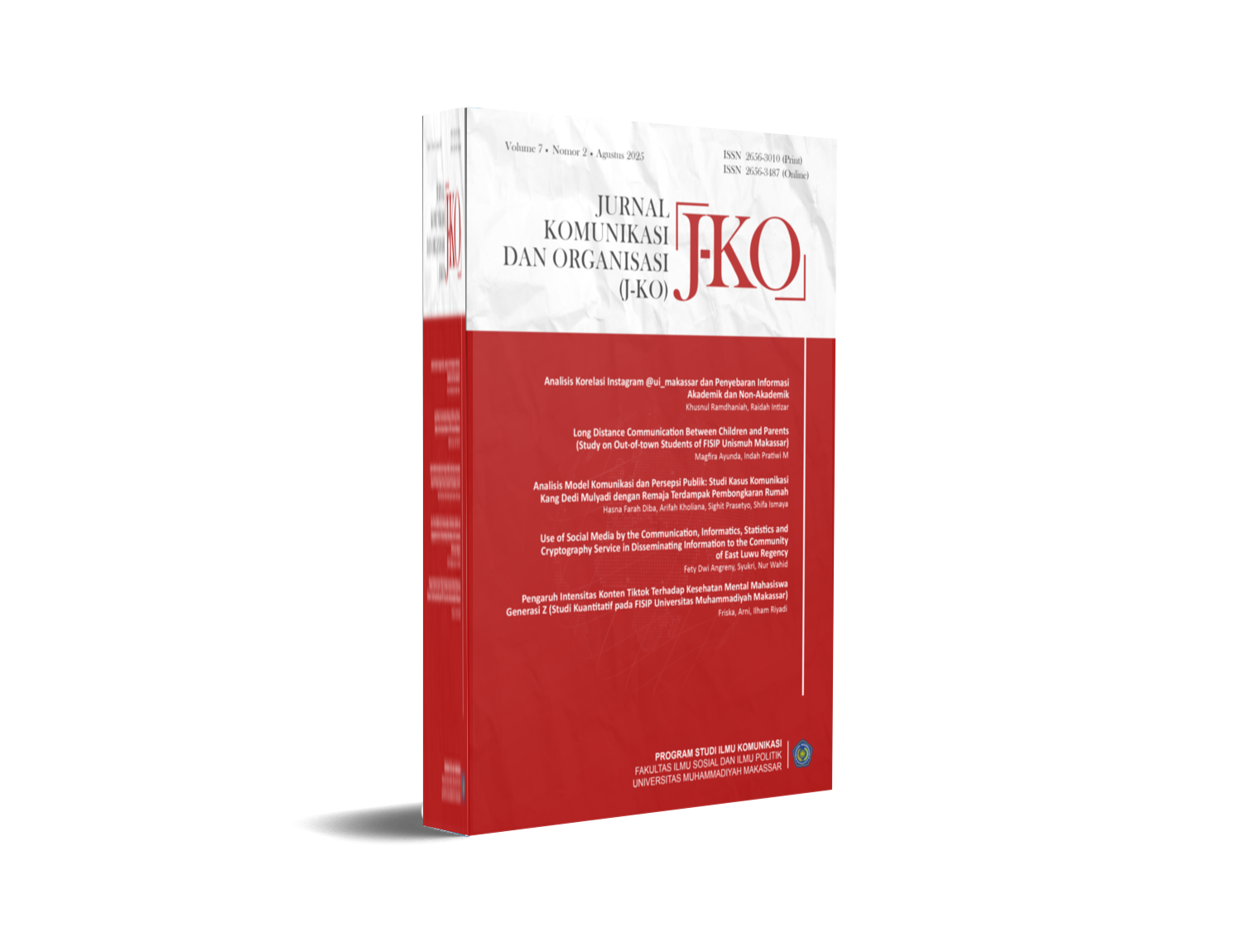Pengaruh Intensitas Konten Tiktok Terhadap Kesehatan Mental Mahasiswa Generasi Z
(Studi Kuantitatif pada FISIP Universitas Muhammadiyah Makassar)
DOI:
https://doi.org/10.26618/f7hv3j47Keywords:
Social Media, Mental Health, Generation ZAbstract
Social media allows users to share, interact, and create content. TikTok is one of the most popular social media platforms in Indonesia, especially among teenagers, millennials, and Gen Z. Therefore, this study aims to analyze the influence of TikTok usage intensity on the mental health of Generation Z students at Muhammadiyah University of Makassar. This study further examines how internal and external factors are crucial to understanding how TikTok influences user behavior. The research method used a quantitative approach with 95 respondents selected through a stratified random sampling technique. Data were collected through a Likert scale questionnaire and analyzed using the Pearson correlation test and simple linear regression. The results showed a significant relationship between the duration of TikTok use (1–3 hours per day) and increased anxiety and stress. The use of TikTok as a social media platform among students who are active on TikTok has an impact on life satisfaction and mental health. These findings support the Social Comparison and Uses and Gratifications theories, and demonstrate the importance of digital literacy and time management in using social media to maintain student mental health.
References
Adnyana, I. M. D. M. (2021). Populasi dan Sampel. Metode Penelitian Pendekatan Kuantitatif, 14(1), 103–116.
Ardiansyah, S., Yunike, Ardiansyah, S., Tribakti, I., Suprapto, Saripah, E., Febriani, I., Zakiyah, Kuntoadi, G. B., Muji, R., Kusumawaty, I., Narulita, S., Juwariah, T., Akhriansyah, M., Putra, E. S., & Kurnia, H. (2023). Buku Ajar Kesehatan Mental.
Cindy Mutia Annur. (2023). Survei KIC-Kominfo: Pengguna TikTok di Indonesia Meroket Tajam Semenjak Pandemi Covid-19. Databoks, 2022–2023.
Dewi, N. P. A., Fajariah, F., & Suardana, I. M. (2023). Pengaruh Content Marketing dan Electronic of Mouth pada Platform TikTok terhadap Keputusan Pembelian di Shopee. Kompeten: Jurnal Ilmiah Ekonomi Dan Bisnis, 1(4), 178–190. https://doi.org/10.57141/kompeten.v1i4.23
Febiola. (2024). Uji Validitas dan Reliabilitas SPSS: Pengertian dan Caranya. ITBOX. https://itbox.id/blog/uji-validitas-dan-reliabilitas-spss-pengertian-dan-caranya/
Hoffman, D. W. (2024). Hubungan Intensitas Penggunaan Media Sosial Dengan Tingkat Stres.
Inggihpangestu. (2022). Mengenal Apa Itu TikTok, Sejarah dan Beberapa Fitur-fiturnya. Idmetafora. https://idmetafora.com/news/read/1353/Mengenal-Apa-Itu-TikTok-Sejarah-dan-Beberapa-Fitur-fiturnya.html
Karunia H, H., Ashri, N., & Irwansyah, I. 2021. (2021). Karunia H, Hans Ashri, Nauvaliana Irwansyah, Irwansyah 2021. Jurnal Teknologi Dan Sistem Informasi Bisnis, 3(1), 92–104.
Khaerunnisa. (2023). Analisis Pengaruh Penggunaan Media Sosial Lingkungan Masyarakat ( Studi Kasus Di Desa Sawakong , Kecamatan Galesong Selatan , Kabupaten Takalar ) Oleh : Khaerunnisa Nomor Induk Mahasiswa : 105651104220 Program Studi Ilmu Komunikasi.
Muhtar. (2023). Ini 7 Media Sosial Paling Banyak Digunakan di Indonesia. UICI. https://uici.ac.id/ini-7-media-sosial-paling-banyak-digunakan-di-indonesia/
Ningsih, W. L. (2023). Pengaruh Penggunaan Media Sosial Terhadap Efektivitas Komunikasi Interpersonal Pada Mahasiswa Jurusan Komunikasi Dan Penyiaran Islam Angkatan Tahun 2020 Iain Ponorogo. Skripsi.
Nur, N. B. B., & Widodo, A. (2023). Analisis Penggunaan Media Sosial Tiktok Terhadap Kesehatan Mental Remaja Di Sma N 2 Sukoharjo. Jurnal Kesehatan Tambusai, 4(4), 6993–6999. https://doi.org/10.31004/jkt.v4i4.22304
Purwanza, S. W., Wardhana, A., Mufidah, A., Renggo, Y. R., Hudang, A. K., Setiawan, J., & Darwin. (2022). Metodologi Penelitian Kuantitatif, Kualitatif dan Kombinasi. In Media Sains Indonesia (Issue March).
Rifa Ramadhani, Rini Riyantini, Miananda Emiliana, & Dinda Puspita Hervira. (2023). Analisis Isi Pesan Persuasif dalam Konten Media Sosial Tiktok @Rubicommunity Mengenai Kampanye Pemberdayaan Perempuan. Communicology: Jurnal Ilmu Komunikasi, 11(2), 178–191. https://doi.org/10.21009/comm.1102.02
Sakitri, G. (2021). Selamat Datang Gen Z , Sang Penggerak Inovasi. Forum Manajemen Prasetiya Mulya, 35(2), 1–10.
Salsabila, N. (2022). Apa Itu Social Comparison. Cxomedia. https://www.cxomedia.id/general-knowledge/20220310133052-55-174080/apa-itu-social-comparison?utm_source=chatgpt.com
Setiawan, H., Solikhina, I., Ni, U., Nada, matun, Sekolah Tinggi Agama Islam An-Nadwah Kuala Tungkal, D., & Sekolah Tinggi Agama Islam An-Nadwah Kuala Tungkal, M. (2022). Kontribusi Agama Dalam Kesehatan Mental. Jurnal Penelitian Sosial Dan Keagamaan, 12(1), 69–87. www.ejournal.annadwahkualatungkal.ac.id
Sofyan, E., & Ridzki Kurniawan, F. (2021). Pengaruh Penggunaan Media Sosial Tiktok Terhadap Perilaku Anak Usia Sekolah. MORES: Jurnal Pendidikan Hukum, Politik Dan Kewarganegaraan, 3(1), 47–56. http://mores.stkippasundan.ac.id/index.php
Syarif, A., & Kalsum, U. (2021). Pengaruh Tiktok Terhadap Prestasi Siswa SMAN 5 Bone. 3, 1–8.
Triastuti, I., Nurfauziah, W. S., & Noviyanti, I. (2025). Tingkat Stres Pada Gen Z Terhadap Pengaruh Media Sosial. 4(1), 264–272.
Umiyati. (2021). Pengaruh Penggunaan Aplikasi Tiktok Terhadap Perilaku Kecanduan Mahasiswa. 4(1), 6.
Downloads
Published
Issue
Section
License

This work is licensed under a Creative Commons Attribution-NonCommercial-ShareAlike 4.0 International License.
Authors who submit manuscripts to the Jurnal Komunikasi dan Organisasi (J-KO) fully understand and agree that, upon acceptance for publication, the copyright of the article shall be transferred to the Jurnal Komunikasi dan Organisasi (J-KO) and the Faculty of Social and Political Sciences, Universitas Muhammadiyah Makassar, as the journal's publisher. Authors are required to submit a signed Copyright Transfer Agreement as part of the publication process. It can be downloaded: Click Here






 2656-3010
2656-3010



